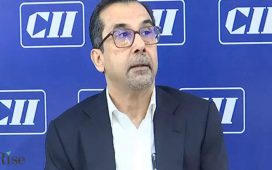For John Caudwell, the giveaway was the bespoke diamond ring. One of Britain’s wealthiest men had decided to put his investment in a diamond retailer called Vashi to the test with some mystery shopping.
“I asked them to design a ring for me. It was terrible,” says the founder of Phones 4u. “They claimed to be experts in design but the customer service was poor – it was slow, not effective and not a good design.”
The billionaire decided to dig deeper, paying a visit to Vashi’s flagship London store in Covent Garden. He stood outside, counting how many shoppers went in, and says that from this snapshot he could not understand the company’s sales claims: “It just didn’t add up.”
Caudwell had already invested £1m in Vashi, after its diamond-trader founder, Vashi Domínguez, wooed him during the pandemic – and came with a promise of donating, also promising to donate to his charity, Caudwell Children. (Caudwell claims Vashi’s charity donation was never forthcoming.) He says he was later asked for a further £2m, but “they became irritable when we wanted a lot more detail” and he did not stump up.
Now the tycoon is among a clutch of high-profile investors nursing losses after Vashi collapsed, leaving a trail of financial wreckage behind it – and questions over the whereabouts of diamonds and jewellery once valued at £157m.
Over more than a decade, the charismatic jeweller had wooed some of the UK’s best known entrepreneurs as shareholders – from Caudwell to shirtmaker Charles Tyrwhitt’s founder Nick Wheeler.
With its Covent Garden store, and presence on social media, the brand had been designed by Domínguez to disrupt the staid diamond trade – offering jewellery designed for customers at relatively low prices, using what it described as ethically sourced, recycled diamonds.
But now the liquidators have been called in, questions have been asked over the existence of the missing stock – and investors, who have been left with an estimated £170m loss, have hired a private investigator to find Domínguez. Of “Vanishing Vashi”, as he is known to some, there is little trace.
Tenerife to Covent Garden
Domínguez was born to a Spanish mother and Indian father on the island of Tenerife in 1978, attending the most expensive school on the largest of Spain’s Canary Islands. His schooling was paid for from the success of his late mother, an insurance broker who Domínguez has said was the top salesperson in the Canaries.
He studied law at the Universidad de la Laguna but left after two years and his first venture was selling imported electronics on the island.
By 20, he had developed an interest in diamonds and travelled to the industry hub in Antwerp repeatedly, eventually managing to buy rocks wholesale for retail in Tenerife and gaining momentum. He talked of attempting to keep a low profile for fear of being the target of thieves while carrying up to £10m of stones in a briefcase.
His first million-pound profit came at the age of just 23, having spotted two businesses in Spain and one in Portugal on the verge of liquidation. After swooping on their stock, Domínguez celebrated with a weekend in a villa in Tenerife with his future wife, Tammy. “I was in the fortunate position where I was able to capitalise on an opportunity,” he would later recall.
In 2007, he set up Diamond Manufacturers – a direct sales business and the vehicle which would later become the holding company for the Vashi brand.
He positioned himself as a diamond expert, securing a flood of media coverage, with pieces in the Financial Times, MailOnline and the Guardian. He even appeared on This Morning, chatting with Holly Willoughby and Phillip Schofield while displaying a £5m crystal egg that he said he was selling for a billionaire in Canada.
Domínguez decided to supplement his online model selling direct to consumers online with shops in prime locations, debuting in London on Piccadilly in 2016, and later opening stores in the City’s Royal Exchange shopping centre and Canary Wharf, with concessions in Selfridges in London and Manchester.
In 2021, as retailers grappled with the pandemic, which was closing physical stores, Domínguez doubled down and opened the glitzy “concept store” in Covent Garden. Its diamond-encrusted jewellery was carefully displayed across two floors, while craftspeople, which Vashi described as “alchemists”, occupied workbenches.
It was all designed to convey a message of exclusive individuality: customers could write love messages which were then displayed on a digital wall; even the store’s scent had been meticulously planned. “We’re trying to create a space that is engaging, inspirational, very immersive and transparent, and we’re trying to demystify the whole industry,” Domínguez said in a promotional video.
The awards – and the rewards – rolled in. Vashi was named one of 15 companies most likely to become “unicorns” – worth more than $1bn – by Forbes. Domínguez was a regional winner in EY’s prestigious entrepreneur of the year prize in 2021.
A dividend of £213,532 was paid to Domínguez in 2021, on top of another of £208,751 a year earlier. Domínguez took frequent family holidays to beach destinations in the Caribbean and Mexico, and professed a “weakness for cars”. He owned a Maserati Quattroporte, which sell for more than £100,000.
“Vashi was a very impressive individual – intense and confident – who seemed to know his business very well,” says Michael Moszynski, an entrepreneur and founder of the agency London Advertising, who invested three years ago.
The fundraising push
Vashi’s rise to prominence came against the backdrop of continuous fundraising efforts, attracting a host of star backers.
Among the big names, Icap billionaire Michael Spencer’s family office held stock but sold out; Boohoo founder Mahmud Kamani was reportedly given shares; and William Jackson, founder of private equity firm Bridgepoint, was also an investor. Spencer, Kamani and Jackson declined to comment.
Charles Tyrwhitt’s Wheeler says Domínguez, with whom he once played tennis, arrived at his house for lunch in a £400,000 Ferrari. He says Domínguez was “always” asking for further funds. “My wife is a very good judge of character … she said ‘get your money out’. He was extremely convincing at first. But I kept asking why he needed so much stock, and the answers were implausible. He asked me for more money, and I said no. I would like him to explain what he has done.”
One wealthy individual who put in more than £1m claims Domínguez had boasted in 2022 that, if the company could successfully launch in the US, a deal to be acquired by Cartier’s owner, Richemont, had been informally agreed. “Vashi was flamboyant, personable and had an impressive background and pedigree,” says the investor, who asked to remain anonymous.
An investor presentation from 2021, seen by the Observer, stated that there was a “clear route to exit with expressed trade interest”, suggesting that a buyer was lined up and that investors could cash out.
The presentation boasted that Vashi had a greater sales density – revenue per square metre of space – than Tiffany, the industry leader.
John Ames, a seasoned digital executive, was hired as chief technology officer in summer 2021 and recalls meeting Domínguez in the Covent Garden store. “He turned up with a £60,000 gold watch on his wrist,” says Ames. “He was very smooth, with visionary talk about what he wanted to do with the business.
“He was a diamond trader and now wanted to build a brand.He told me he anticipated an exit to a luxury brand where Vashi could slot into their retail real estate.”
But within weeks, alarm bells rang. “There was no governance: no board meetings or board packs produced, and no easily accessible financial reporting,” Ames claims.
after newsletter promotion
Audited accounts for Diamond Manufacturers Ltd, filed at Companies House, showed full-year sales were up 97% in 2021, at £105.4m, from £53.6m in 2020. Pre-tax profits hit £14m in 2021, up from £4.9m in 2020. The company was aiming to raise £24m to fund high-end New York store openings, and £51m to buy stock – a £75m fundraising round which began in 2021 and valued the business at £250m. Vashi hoped to open in Japan, and have 200 stores in 15 countries “in the near future”.
Dealer loses sparkle
The cracks started to show in December 2022, when Vashi was the subject of a winding-up petition from one of its landlords, Canary Wharf Retail. Vashi owed it more than £250,000, and a further £3.5m to other creditors, including diamond suppliers, according to a witness statement submitted by Domínguez to the winding-up hearing.
He asked for more time for Vashi to repay its debts. Covid had hit footfall and interest rates had risen on its borrowing, he argued. As a result, he said, he was cutting its workforce by half to 100 employees and delaying the US expansion.
Despite his plea, liquidators from the restructuring firm Teneo were appointed in April 2023. Domínguez disappeared shortly after that, sources say.
Liquidators quickly found that it would not be viable for the firm to continue to trade as there was “no available funding nor any certainty around the prospects of trading profitability”, their report says.
Another early job was to secure the diamonds, jewellery and business records, visiting all sites in the process and accessing safes. Staff were asked whether any further assets might be found off site.
Disparities soon emerged. The 2021 accounts, audited by a small firm called Inger & Co (I&C), reported the value of Vashi’s stock was about £129m. Stock reports by I&C valued the stock at £149m in October 2022, and then £157m in February 2023, including £120m in loose diamonds. The firm, whose office in Ilford, east London, is sandwiched between a Londis store and a grocer, did not explain how the stock had been valued in the accounts and stock reports.
However, liquidators note: “The stock collected was deemed to be significantly lower value than that noted in the 2021 accounts” and that they had found no evidence that “such a level of assets” had been owned “at any point in the company’s history”. When specialists enlisted by the liquidators valued the stock and sold it via auction they realised a value of just £147,000.
That left investors fuming. “The independent valuation of the diamonds they had in stock gave me confidence that, even if the business failed, I would get most of my money back,” says Moszynski.
Teneo says it is “uncertain” whether claims for £2.5m from primary creditors will be paid. Moreover, it does not expect to be able to return the £4.6m owed to HMRC or the 275 claims for a total of £162m from unsecured creditors.
“I’m angry with Vashi, the auditors, the gem valuers and those around him; this appeared a sound investment,” says Moszynski. “Investors are now calling him ‘Vanishing Vashi’.”
Some investors have felt let down by another member of the Vashi team, Charles Leach, who they say helped persuade them to plough in money. Leach, who was listed as chief financial officer (CFO) in investor materials, described himself as “consultant CFO”. Leach claims he had no access to internal company financial documents, and that he lost his own money in Vashi’s collapse and feels “used” by its founder. “It’s hard to put into words the trauma of this experience,” he says.
Investors say they also raised concerns directly with Domínguez over I&C. They argued that, as a small operation, it was unsuitable to approve accounts for such a large company. I&C declined to comment.
Investors believe the company raised at least £120m in convertible loan notes, as well as a further £50m raised in 2022, putting the loss at about £170m if nothing substantial is recovered. One US family office alone sunk more than £10m in, a former employee says.
Ultimately, it is unclear where that money has been spent, and, if the business ever owned diamonds worth more than £100m, where they are now.
Sources close to the company also allege Vashi staff were asked to pose as customers in order to make the stores appear busier than in reality. A post on the workplace review site Glassdoor makes the same claim.
Hunting Domínguez
Some investors hired a private investigator to find Domínguez but decided against “throwing good money after bad” after initial work. Several sources believe he is in Dubai – a popular destination for the tycoon when away from the family home in central London.
The Observer attempted to reach Domínguez via two London addresses. At one, a woman claimed to have no knowledge of him.
Investors are now nursing their losses. “Some of the experienced investors are simply embarrassed that this has happened,” says one creditor. Another says: “What gave me encouragement was that there were seasoned investors already in the business.”
The former Pret a Manger boss Clive Schlee, a member of the registered creditors’ committee, says: “I’m over it. I haven’t got any comment to make.”
Caudwell, with an estimated fortune of £1.5bn, is relatively unconcerned by the financial loss. “We did a fair amount of due diligence – clearly not enough, but there’s only so much resource you can put into a £1m investment,” he says.
Moszynski says: “When Vashi was issued with a winding-up order, it was a shock: the audited accounts had boasted of healthy growth with revenues of more than £100m. From the liquidators’ report, it looks like the investors will get nothing back.
“It’s imperative that the collapse of Vashi is investigated by the authorities to give people confidence in investing in the UK in the future. This is not just about [protecting] investors, but safeguarding job creation and tax revenues that pay for the NHS and more.”
He has submitted a complaint and evidence to the UK’s Serious Fraud Office. The SFO declined to say whether it would investigate.
Ames says: “What made me really angry was there were so many good people in that business: young, motivated, inspiring. That was really upsetting.”








